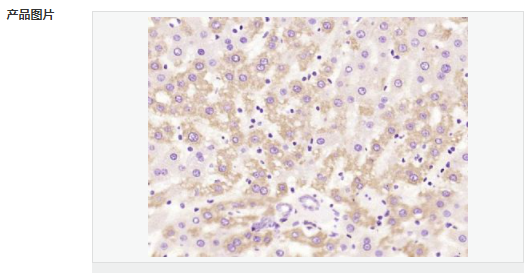

貨號
產(chǎn)品規(guī)格
售價
備注
BN40499R-100ul
100ul
¥2360.00
交叉反應(yīng):Rat(predicted:Human,Mouse,Pig,Cow,Horse,Rabbit,Sheep) 推薦應(yīng)用:IHC-P,IHC-F,ICC,IF,ELISA
BN40499R-200ul
200ul
¥3490.00
交叉反應(yīng):Rat(predicted:Human,Mouse,Pig,Cow,Horse,Rabbit,Sheep) 推薦應(yīng)用:IHC-P,IHC-F,ICC,IF,ELISA
產(chǎn)品描述
| 英文名稱 | HSD17B11 |
| 中文名稱 | 17β羥基類固醇脫氫酶11/17β-HSD11抗體 |
| 別 名 | 17 beta HSD 11; 17 beta HSD XI; 17 BETA HSD11; 17 BETA HSDXI; 17 beta hydroxysteroid dehydrogenase 11; 17 beta hydroxysteroid dehydrogenase type XI; 17 beta hydroxysteroid dehydrogenase XI; 17-beta-HSD 11; 17-beta-HSD XI; 17-beta-hydroxysteroid dehydrogenase 11; 17-beta-hydroxysteroid dehydrogenase XI; 17betaHSD11; 17betaHSDXI; 17bHSD11; CTCL associated antigen HD CL 03; CTCL tumor antigen HD CL 03; CTCL-associated antigen HD-CL-03; Cutaneous T cell lymphoma associated antigen HD CL 03; Cutaneous T-cell lymphoma-associated antigen HD-CL-03; Dehydrogenase/reductase SDR family member 8; DHB11_HUMAN; DHRS8; Estradiol 17 beta dehydrogenase 11; Estradiol 17-beta-dehydrogenase 11; Hsd17b11; Hydroxysteroid (17 beta) dehydrogenase 11; PAN1B; Retinal short chain dehydrogenase/reductase 2; Retinal short-chain dehydrogenase/reductase 2; RETSDR2; SDR16C2; SDR2; Short chain dehydrogenase/reductase family 16C member 2; T cell lymphoma associated antigen HD CL 03; 17β-HSD11. |
| 研究領(lǐng)域 | 細胞生物 信號轉(zhuǎn)導 生長因子和激素 |
| 抗體來源 | Rabbit |
| 克隆類型 | Polyclonal |
| 交叉反應(yīng) | Rat, (predicted: Human, Mouse, Pig, Cow, Horse, Rabbit, Sheep, ) |
| 產(chǎn)品應(yīng)用 | ELISA=1:5000-10000 IHC-P=1:100-500 IHC-F=1:100-500 ICC=1:100-500 IF=1:100-500 (石蠟切片需做抗原修復) not yet tested in other applications. optimal dilutions/concentrations should be determined by the end user. |
| 分 子 量 | 31kDa |
| 細胞定位 | 分泌型蛋白 |
| 性 狀 | Liquid |
| 濃 度 | 1mg/ml |
| 免 疫 原 | KLH conjugated synthetic peptide derived from human Hsd17b11:201-300/300 |
| 亞 型 | IgG |
| 純化方法 | affinity purified by Protein A |
| 儲 存 液 | 0.01M TBS(pH7.4) with 1% BSA, 0.03% Proclin300 and 50% Glycerol. |
| 保存條件 | Shipped at 4℃. Store at -20 °C for one year. Avoid repeated freeze/thaw cycles. |
| PubMed | PubMed |
| 產(chǎn)品介紹 | Short-chain alcohol dehydrogenases, such as HSD17B11, metabolize secondary alcohols and ketones (Brereton et al., 2001 [PubMed 11165019]).[supplied by OMIM, Jun 2009] Function: Can convert androstan-3-alpha,17-beta-diol (3-alpha-diol) to androsterone in vitro, suggesting that it may participate in androgen metabolism during steroidogenesis. May act by metabolizing compounds that stimulate steroid synthesis and/or by generating metabolites that inhibit it. Has no activity toward DHEA (dehydroepiandrosterone), or A-dione (4-androste-3,17-dione), and only a slight activity toward testosterone to A-dione. Tumor-associated antigen in cutaneous T-cell lymphoma. Subcellular Location: Secreted. Tissue Specificity: Present at high level in steroidogenic cells such as syncytiotrophoblasts, sebaceous gland, Leydig cells, and granulosa cells of the dominant follicle and corpus luteum. In lung, it is detected in the ciliated epithelium and in acini of adult trachea, in bronchioles, but not in alveoli. In the eye, it is detected in the nonpigmented epithelium of the ciliary body and, at lower level, in the inner nuclear layer of the retina (at protein level). Widely expressed. Highly expressed in retina, pancreas, kidney, liver, lung, adrenal, small intestine, ovary and heart. Similarity: Belongs to the short-chain dehydrogenases/reductases (SDR) family. 17-beta-HSD 3 subfamily. SWISS: Q8NBQ5 Gene ID: 51170 Database links: Entrez Gene: 51170 Human Entrez Gene: 114664 Mouse Omim: 612831 Human SwissProt: Q8NBQ5 Human SwissProt: Q9EQ06 Mouse Unigene: 594923 Human Unigene: 46019 Mouse Unigene: 102059 Rat Important Note: This product as supplied is intended for research use only, not for use in human, therapeutic or diagnostic applications. |
